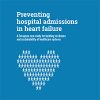Context
Early detection of lung cancer and reduction of hospitalisations in heart failure are crucial elements of improving the effectiveness of healthcare.
In 2013, in the wake of the first UN Global Summit on non-communicable diseases (NCDs), governments around the world committed to reducing premature mortality due to NCDs by one third by 2030. This goal was later integrated into the UN Agenda for Sustainable Development, with Sustainable Development Goal 3.4 focusing on reducing mortality from NCDs.
Reducing the burden of lung cancer and heart failure is essential to achieving this goal. Cancer accounts for 1 in 6 deaths across the world, and for 1 in 3 premature deaths due to NCDs in people aged 30–69. Heart failure, meanwhile, is the most common cause of hospital admission among people over 65 and the most common cause of unplanned admissions for all age groups.
Apart from prevention, early detection presents the greatest opportunity to reduce premature mortality from cancer. It allows clinicians to identify cancer at a point when it has yet to spread through the body and when effective treatment is still possible. Not only does this reduce the risk of death and poor quality of life, it also significantly lowers healthcare costs. When implemented at scale, lung cancer screening programmes offer an opportunity to greatly reduce the burden of lung cancer.
Heart failure tends to receive little strategic attention from governments. There is low awareness of heart failure among decision-makers and the wider public, which appears to translate into low prioritisation in long-term healthcare plans and policies. But it is a major driver of hospitalisations and bed days – and addressing it offers an important opportunity to reduce preventable admissions.


